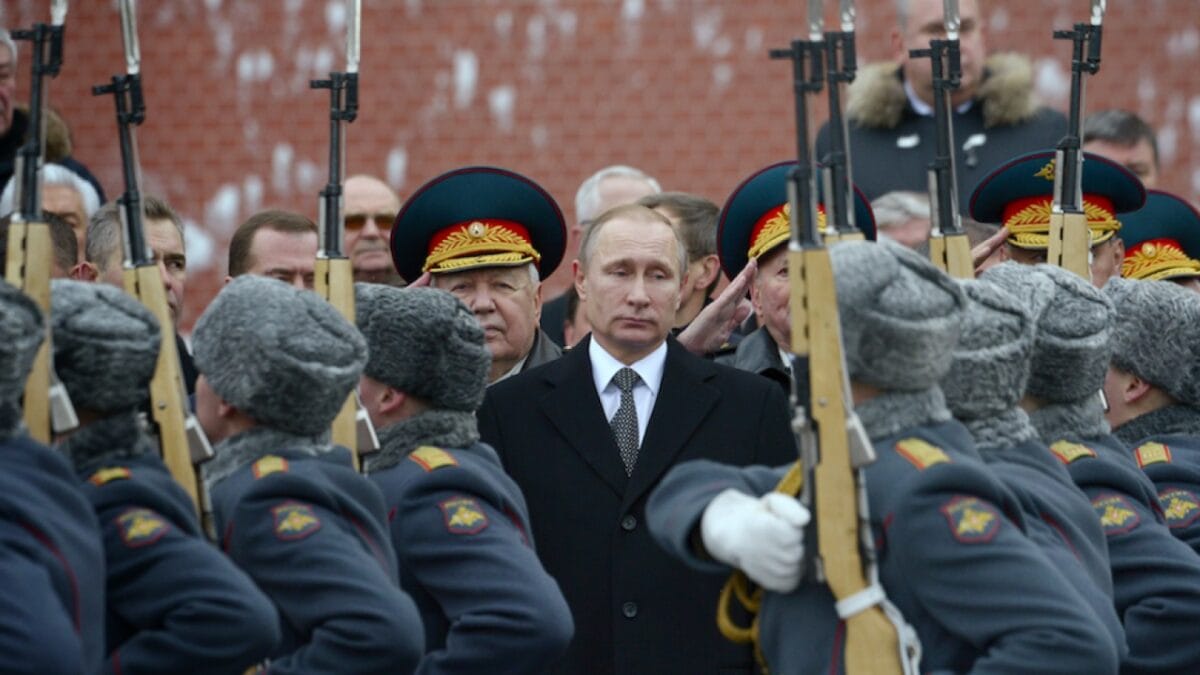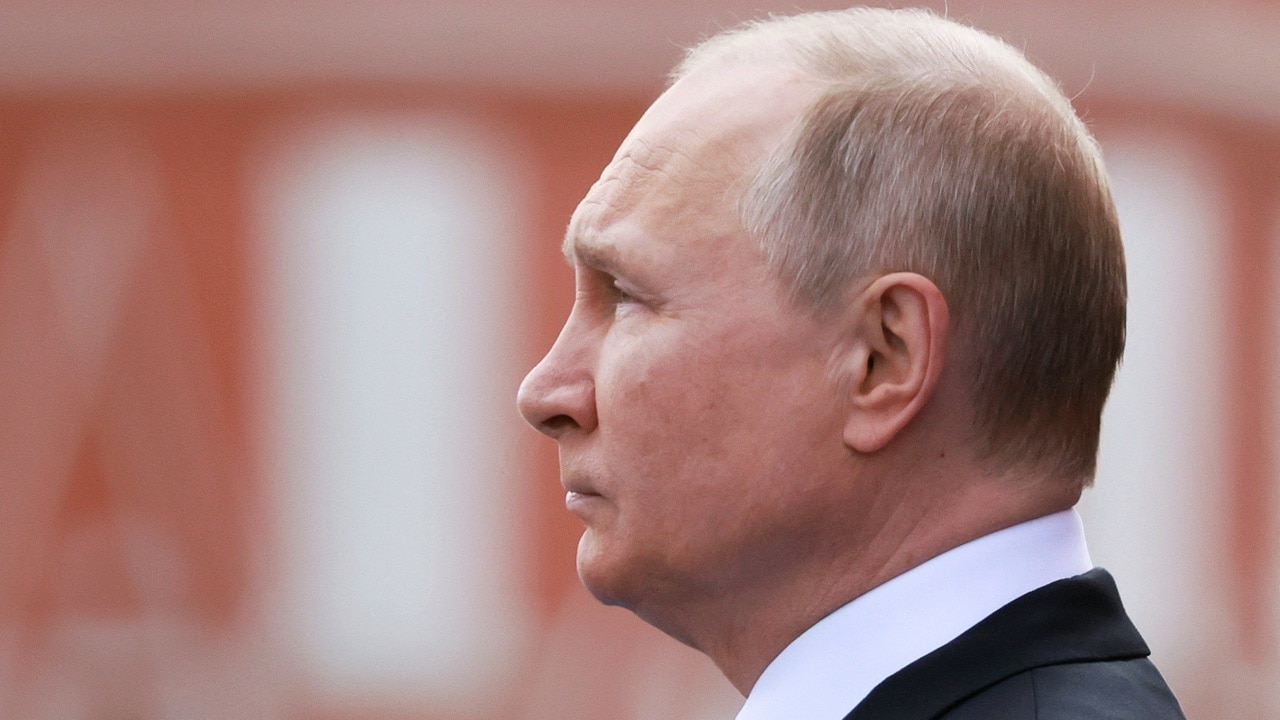How Can Ukraine ‘talk’ with Russia when Putin’s goal seems to be to ensure Ukraine doesn’t exist? Imagine it’s 1944 in Europe, and some Allied leader says the following: “We will have a peace to build tomorrow, let us never forget that…. We will have to do this with Jews and Germans around the table. The end of the discussion and the negotiation will be set by Jews and Germans. But it will not be done in denial, nor in exclusion of each other, nor even in humiliation.”
I suspect most people would agree that the proposal is preposterous, obscene, and doomed to failure. How could Adolf Hitler and a representative of the Jewish community possibly talk about anything? Hitler is determined to annihilate Jews, and Jews want to survive. A meeting of the minds is impossible under such zero-sum conditions.
Replace Jews with Ukraine and Germans with Russia, and you’ll get the statement made by French President Emmanuel Macron in Strasbourg on May 9. Although Russia’s ongoing genocide in Ukraine is nowhere nearly as destructive as the Holocaust—after all, the war has been going on for only three months—the logic of the negotiation is identical in both cases. Just as Jews could negotiate with Germans only after the latter’s defeat, apology, and renunciation of anti-Semitism and Nazism, so too Ukraine can negotiate with Russia only after its defeat, apology, and renunciation of anti-Ukrainianism and Nazism.
Until that happens, Putin’s Russia will remain a rogue fascist state committed to destroying Ukraine and Ukrainians and expanding its empire to all the nations controlled by Soviet Russia. As a deputy of the Moscow city council recently said, Russia must “de-Nazify” Estonia, Latvia, Lithuania, Poland, Moldova, and Kazakhstan.
Russian policymakers have repeatedly said that Ukraine is an artificial construct and that Ukrainians don’t exist. A Duma deputy has declared that “the very notion of Ukraine should not exist in the future.” Neither should “the notion of Ukrainian.” He says his views are “radical,” when in fact, they’re mainstream in today’s Russia. Thus, the Enlightenment “educational publishing house … has ordered its employees to drop as many references to Ukraine and Kyiv from the texts because in the words of one editor, ‘we must make it look as if Ukraine does not exist’.” And, a few weeks ago, one Russian publicist proposed a detailed blueprint of the Ukrainian nation’s extermination.
Russian soldiers have killed, raped, and looted with abandon, committing multiple war crimes in the process. At the same time, Russians have destroyed and looted almost 200 Ukrainian cultural heritage sites. Just two examples: A museum dedicated to the 18th-century Ukrainian philosopher, Hryhory Skovoroda, was shelled in early May; a few days later, a cache of ancient Scythian gold jewelry and artifacts was stolen from a museum in Melitopil.
Tens of thousands of Ukrainian civilians have been killed in Mariupil; thousands more have died in other Ukrainian villages, towns, and cities. Hundreds of thousands have been “ethnically cleansed” and forcibly deported to Russia. Thousands of children have been kidnapped.
Russia’s actions today are little different from its actions in the early 1930s, when Moscow launched an anti-Ukrainian campaign recognized as genocide by Rafael Lemkin, the Polish-Jewish scholar who coined the term. Then as now, Moscow aimed to destroy Ukrainians physically as well as their “tradition, folk lore and music, the national language and literature, the national spirit.” Then as now, if Moscow’s plans succeed, “Ukraine will be as dead”—to quote Lemkin—”as if every Ukrainian were killed, for it will have lost that part of it which has kept and developed its culture, its beliefs, its common ideas, which have guided it and given it a soul, which, in short, made it a nation rather than a mass of people.”
Given Putin Russia’s clearly genocidal aims in Ukraine, just what are Ukrainians and Russians supposed to talk about? Indeed, what could President Macron or any of his Western counterparts talk about with Putin? About the numbers of Ukrainians he should kill? About the number of missiles he should rain down on Ukrainian cities? About the pace of the genocide? About the construction of ghettos?
Like Hitler, Putin must first be defeated and his country de-Nazified before any kind of reasonable dialogue can take place between Russia and Ukraine—as well as between Russia and the West. That doesn’t mean that diplomacy should cease: miracles do happen. Nor does defeat mean Russia’s collapse or destruction. But it does mean, at a minimum, Russia’s withdrawal from Ukraine and, arguably more important, Putin’s departure. The West should have no illusions. Even if Putin avails himself of some “off ramps,” his Russia will remain a threat to world peace, and renewed war—with Ukraine or with other post-Soviet states—will be well-nigh inevitable. European Commission President Ursula von der Leyen was absolutely right to say that Russia “is today the most direct threat to the world order.”

Russian President Putin. Image Credit: Creative Commons.
She could have added that it will remain so as long as Putin remains in power. Only after he leaves will it be possible, as one Russian commentator recommends, for Russia to “admit defeat, conclude a peace, and move on to reforms as soon as possible.”
Dr. Alexander Motyl is a professor of political science at Rutgers-Newark. A specialist on Ukraine, Russia, and the USSR, and on nationalism, revolutions, empires, and theory, he is the author of 10 books of nonfiction, including Pidsumky imperii (2009); Puti imperii (2004); Imperial Ends: The Decay, Collapse, and Revival of Empires (2001); Revolutions, Nations, Empires: Conceptual Limits and Theoretical Possibilities (1999); Dilemmas of Independence: Ukraine after Totalitarianism (1993); and The Turn to the Right: The Ideological Origins and Development of Ukrainian Nationalism, 1919–1929 (1980); the editor of 15 volumes, including The Encyclopedia of Nationalism (2000) and The Holodomor Reader (2012); and a contributor of dozens of articles to academic and policy journals, newspaper op-ed pages, and magazines. He also has a weekly blog, “Ukraine’s Orange Blues.”

